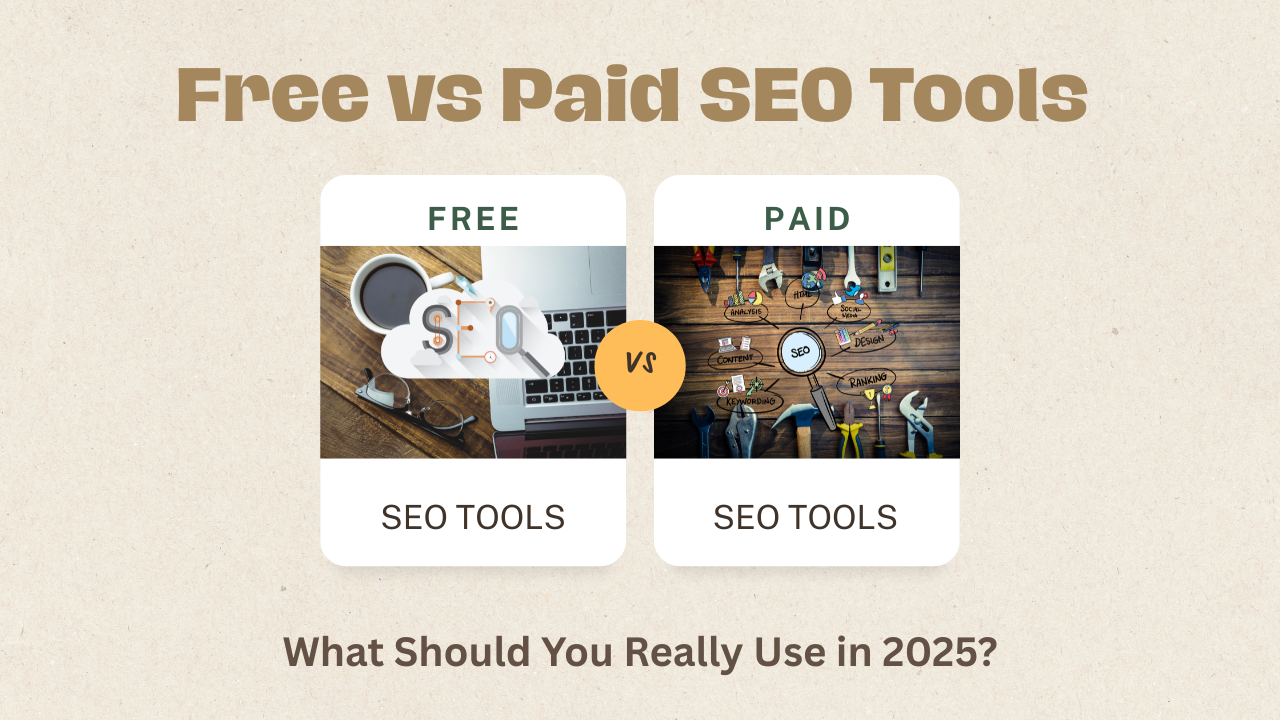Let’s be real—SEO tools are everywhere.
>Some are free. Some are pricey. Some promise the moon. Others… well, they barely scratch the surface.
If you’re trying to grow your website in 2025 and wondering if you really need to pay for SEO tools, this guide is for you.
We’ve tested the top options, compared features, and laid it all out in plain English.
Let’s dive in.
Why SEO Tools Even Matter
First, why use SEO tools at all?
Because they help you:
Find the right keywords
Track website traffic
Spy on competitors (👀)
Fix technical SEO issues
Get content ideas
Monitor backlinks
Without tools, you’re just guessing. And guessing doesn’t work in 2025.
Also Read: Top 5 Tech Gadgets Released This Month (April 2025)
Free SEO Tools: What You Get for $0

Let’s start with the freebies. Here are some top-notch tools that don’t cost a dime:
1. Google Search Console
See what keywords people use to find you
Track page performance
Spot technical issues
Best for beginners and essential for everyone.
2. Google Analytics 4
Free traffic analysis
Learn how users behave on your site
Powerful, but a bit complex.
3. Ubersuggest (Free Version)
Basic keyword research
Limited daily searches
Great for small websites.
4. Ahrefs Webmaster Tools
Free site audit
Backlink analysis
Not full Ahrefs, but helpful for technical SEO.
5. Answer the Public (Free Tier)
Content ideas based on real searches
Limited free searches daily, but awesome for brainstorming blog topics.
Paid SEO Tools: What You Get for Your Money

Free is great. But if you’re serious about scaling, paid tools bring the heat.
Here are some top picks in 2025:
1. SEMrush (Starting at $129.95/month)
Deep keyword research
Competitor spying
Rank tracking
Site audits
Ideal for agencies and advanced users.
2. Ahrefs (Starts at $99/month)
Best-in-class backlink data
Super powerful keyword tools
Detailed competitor reports
Expensive, but worth it if backlinks are your focus.
3. Surfer SEO (Starts at $89/month)
AI content optimization
Real-time content scoring
SERP analysis
Perfect for bloggers and content marketers.
4. Moz Pro (Starts at $99/month)
User-friendly interface
Strong link metrics
Keyword explorer
Good all-rounder for beginners moving up.
Free vs Paid: The Real Differences
| Feature | Free Tools | Paid Tools |
|---|---|---|
| Keyword Research | Basic & limited | In-depth with competition data |
| Backlink Analysis | Partial or no data | Full link profiles |
| Rank Tracking | Manual or unavailable | Daily updates, full history |
| Site Audits | Surface-level | Deep crawl & issue detection |
| Competitor Analysis | Very limited | Extensive, real-time tracking |
| Content Optimization | None or minimal | AI suggestions, scoring, NLP |
Read Now: Top 10 AI Writing Tools of 2025 (Tested & Compared)
So… What Should You Really Use in 2025?
Here’s the honest answer:
If you’re a beginner, blogger, or on a tight budget:
Start with free tools like Google Search Console and Ubersuggest. Learn the basics, get your SEO game rolling, and grow your site organically.If you’re running a business, agency, or scaling fast:
Invest in one or two paid tools. Ahrefs, SEMrush, or Surfer SEO can help you compete at a higher level and save hours of manual work.Still unsure?
Many tools offer free trials—test them out for a week and see what clicks.
Read More: Best Project Management Software for Small Teams in 2025
Final Thoughts
SEO in 2025 is competitive—but not impossible.
Free tools are awesome for getting started.
Paid tools are great for scaling and dominating.
Use what fits your budget and goals.
And remember, a tool is only as good as the person using it.
Keep learning, keep experimenting, and watch your rankings grow 🚀

